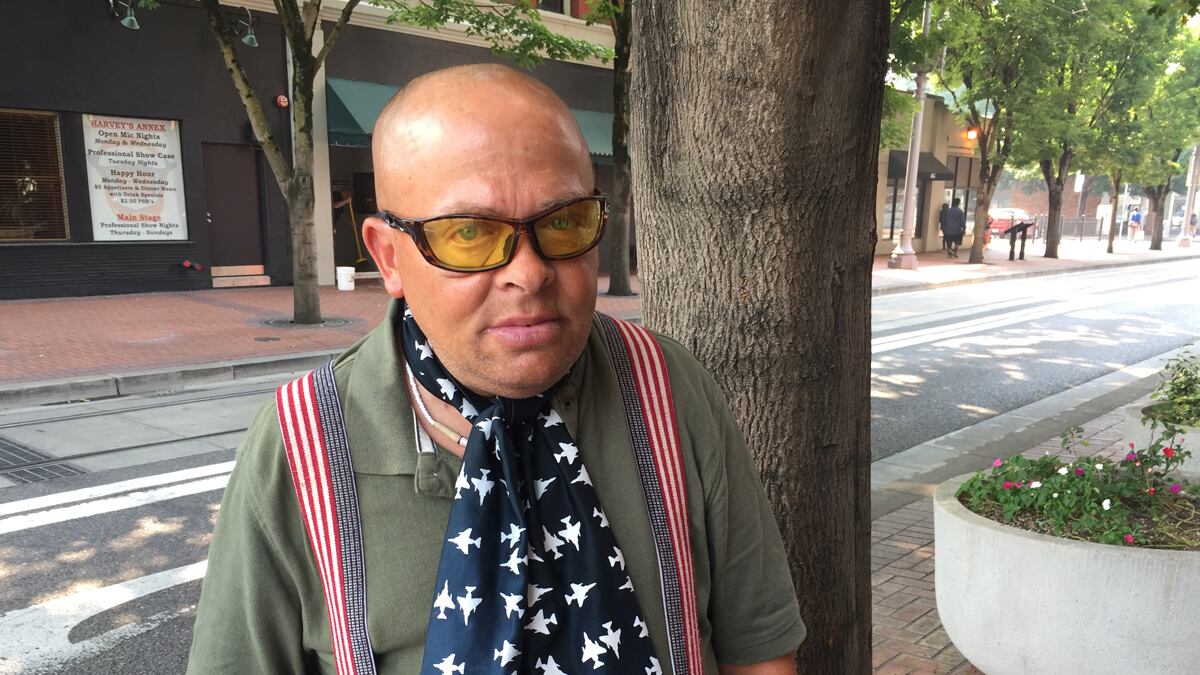There are a lot of barriers to ending homelessness for Portland veterans.
Darrell L. Snook, for instance, is both a Vietnam Navy veteran and a registered sex offender. He and his wife, Pamela, say that's not the biggest irony in their lives, however.

That would be their marriage, which they see as a Catch-22 that keeps them on the streets. They tied the knot on Pearl Harbor Day in 2014, but were surprised to see their union lead to reduced income and thwarted housing opportunities.
"I was offered housing through the VA if I left Pamela," Darrell says. He turned down a single-room occupancy unit in the Henry, a 153-unit affordable apartment building at 309 SW 4th Ave. run by Central City Concern.
Pamela says JOIN, a homeless outreach agency, offered her a grant for move-in costs if she found an apartment, but her caseworker wouldn't add her husband to the grant because of his criminal history.
"Isn't that fucked?" Pamela says. (The couple now lives in a GMC van.)
Representatives of those organizations said they cannot discuss specific clients, but painted a different picture of how the system works.
Central City Concern spokeswoman Kathy Pape says her agency tries to be flexible. "If someone were in the veterans program at the Henry and wished to find housing to live with a partner," Pape says, "we would help find such permanent housing for them."
But Shannon Singleton, executive director of JOIN, acknowledges criminal convictions can be a barrier to housing. "Some of the federal dollars/vouchers have restrictions on legal histories," Singleton says.
The Snooks' story is just one example of the gap between the success stories told by officials and homeless veterans' experience of opportunities limited by a rigid bureaucracy.
Last year, Portland claimed to be the first West Coast city to "end" veteran homelessness. "No veteran that needs housing is being left outside," then-Mayor Charlie Hales said in December.
But for local veterans still living on the street, the claim was a joke.
Al Artero, commander of American Legion Post 134 on Northeast Alberta Street, saw a story trumpeting the news on TV. He watched it with a homeless veteran who frequents the post.
"We were like, 'Hey, man, let's go get your keys!'" Artero recalls. "That was an unfortunate way to put it. It is more accurate to say that there is a sustainable strategy, a long-term plan for actually dealing with this."
Portland's claim stemmed from recognition by the U.S. Interagency Council on Homelessness of an effort by a coalition of local groups that resulted in permanent housing for 1,300 local homeless veterans in 2015 and 2016.
That was real progress, but the June 2017 "point in time" count of homeless in Multnomah County, however, found 446 homeless veterans in the county, 24 more than in 2015.
Michael Buonocore, executive director of Home Forward, says nobody in the coalition meant to be misleading.
"[We] never said this was over or that we had completely ended veteran homelessness," Buonocore says. "Portland did meet the benchmarks for "effectively" ending veteran homelessness, and even though we recognize there is still a lot hard work to be done, it was a significant milestone for our community."
Vets say the battle never ends.
"It's always some formality," with the VA system, says Charles Blackmon, 56, a Marines and Army National Guard veteran with post-traumatic stress disorder. "They don't give me answers, all they do is tell me no," Blackmon says. "They been telling me that for 35 years."
Others, like Navy vet Reuben Strand, 72, say their questions about housing have been "fluffed off" by VA workers.
"We're always going to have [homeless veterans]," says Army veteran Mark Nicholas as he pushes a shopping cart along Northwest 6th Avenue between Bud Clark Commons and Sisters of the Road. Nicholas, 56, is staying in a shelter at Southeast Grand Avenue and Stark Street.
"Some veterans gave all they had, and then they come back home and they're looked down upon," Nicholas adds. "We went into the military with good intentions, but we wind up being another person when we come out—that we're not proud to be."
Nicholas says he learned to manage his mental illness and drinking from VA staff "up on the hill."
Like 31 percent of veterans, Nicholas also suffers from PTSD. He says his allies in the fight to manage addiction and mental illness are veterans—not "bookworms."
Vets have strong allies in the system: Buonocore is a veteran, and Alex Glover, housing director for Transition Projects, is one of seven on his agency's "vets team." Glover says the push to help veterans in 2015 and 2016 created a "veteran by name" registry, and got more vets into shelters.
That's crucial, he says, because houseless veterans sometimes head into the "deep woods" in Forest Park or along the Sandy River.
"A lot of them call it bivouacking," says Glover. "We have some where those survival skills are on point, and it works for them."

